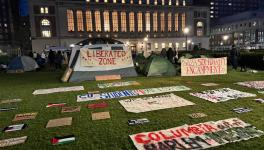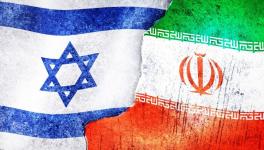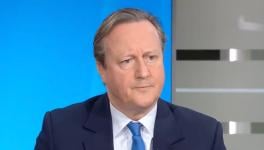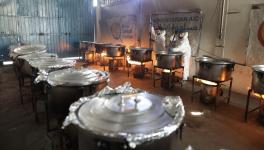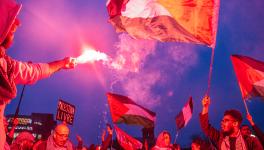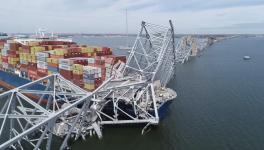How to Save Jerusalem and Bring Peace to the Middle East

Most commentators expected US President Donald Trump's announcement recognising Jerusalem as Israel's capital to escalate tension, fuel violence and possibly provoke another regional war, which would have helped the US administration to change power balances in a Middle East in which it is gradually losing ground.
Trump's Jerusalem speech came only a day before Russia announced the successful conclusion of its mission to destroy Saudi sponsored Islamic State (IS) in Syria - a sort of victory declaration over Saudi-US interests that most likely marks the end of the war in Syria.
Destablising the region
The latest developments in Syria have in fact triggered an ever more open display of the alliance between the US, Israel and Saudi Arabia, which in recent months have engaged in a number of initiatives seemingly aimed at bringing the region at the brink of yet another war.
From the ongoing Saudi siege on Qatar to the ongoing war on Yemen - all these moves have unsuccessfully tried to destabilise the existing status quo in the region. Trump's declaration on Jerusalem continues in this line.
Jerusalem is a cornerstone of identity and pride far beyond Palestine. It is a symbol of Arab defiance. Palestinians are already protesting with a rising number of injuries due to Israeli repression, in the Arab world people have taken to the streets and rallies are being organised for the weekend in front of US consulates around the world.
However, if Trump's advisors thought that recognising Jerusalem as the capital of Israel would provoke their opponents, in particular Iran and its allies, enough to drive the region into war, they have been proven wrong.
Moreover, Trump's move on Jerusalem has weakened the US-Israel-Saudi axis as it obliges the Saudi leadership to back down, at least temporarily, from the increasingly open normalisation with Israel.
Trump may have failed to provoke another war but could surely trigger alternative approaches to resolving the conflict.
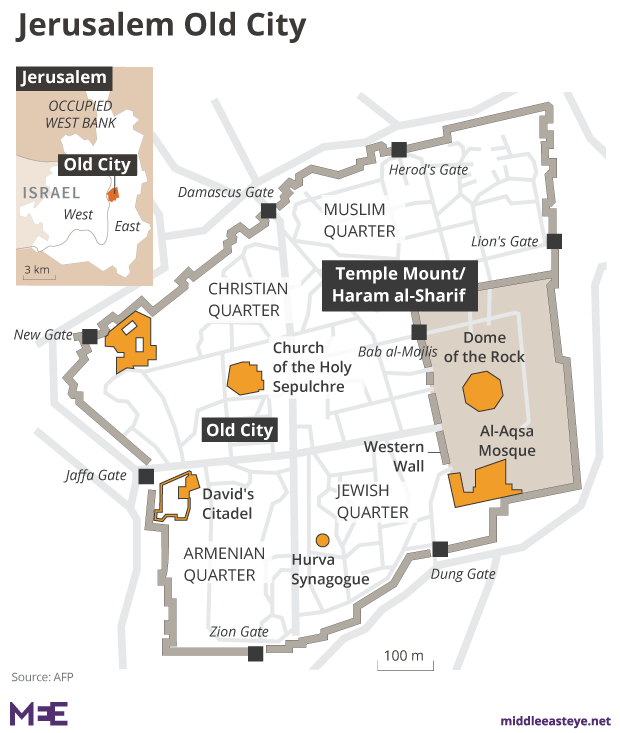
Alternative approaches
The core issue behind the recognition of Jerusalem as Israel's capital is the arbitrary recognition of Israeli sovereignty over the city.
Jerusalem has a special status under international law. The international community does not recognise Israeli sovereignty over any of the parts of Jerusalem and hence does not recognise it as Israel's capital. Additionally, East Jerusalem has been illegally occupied, annexed and colonised by Israel since 1967.
Trump's declaration has given a green light for Israel to continue its occupation, apartheid and ethnic cleansing based on the illegal acquisition of territory by force. Particularly in Jerusalem, Palestinians are bracing for more home demolitions, more repression, more settlements and more expulsions.
The expansion of the E1 settlement block and the displacement of the Bedouin communities east of Jerusalem will soon be moving ahead.
With this move, Trump has as well claimed the right for the US to bypass international law and consensus and redefine territorial sovereignty around the globe according to its whim.
Silence from the international community would legitimise this disdain for international law. Stopping it should be a global responsibility towards humanity.
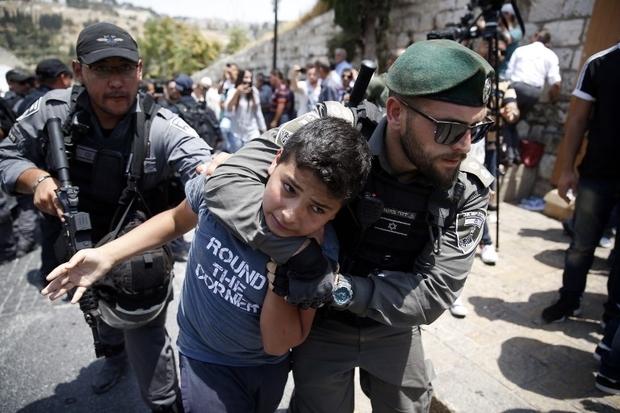
Israeli border guards detain a Palestinian youth during a demonstration outside the Lions Gate, a main entrance to Al-Aqsa mosque compound 17 July 2017 (AFP)
Return to the one-state solution
The US administration's attempt to unilaterally hand over Jerusalem as a capital to Israel is in line with Trump's declaration earlier this year ending US commitment to a two-state solution. Without Jerusalem, a Palestinian state is unthinkable.
Israel had closed all possibility for a two-state solution long before. The up to eight-meter-high apartheid Wall cutting us off from our fields and isolating our communities, daily increasing settlements, and a brutal siege on the Gaza Strip have all made that solution impossible.
Today more than ever, the international community should come to terms with what the 2016 UN Security Council resolution condemning Israel's settlement policy has already denounced as "a one-state reality".
Israel has extended a cruel apartheid regime over all of historic Palestine and the task is to end this illegal, human-rights-violating reality.
If a one-state solution is what the international community wants, I am confident that as Palestinians we are ready for that option. Self-determination on a land with equal citizenship, irrespective of religion, has since the beginning been our proposal for justice.
This solution respects our right to self-determination and human rights for all, including the right of return of our refugees. It should naturally foresee reparation for the losses and damages.
What Palestinians will not accept is what EU foreign policy chief Federica Mogherini rightly defined as "a one-state reality with unequal rights, perpetual occupation and conflict".
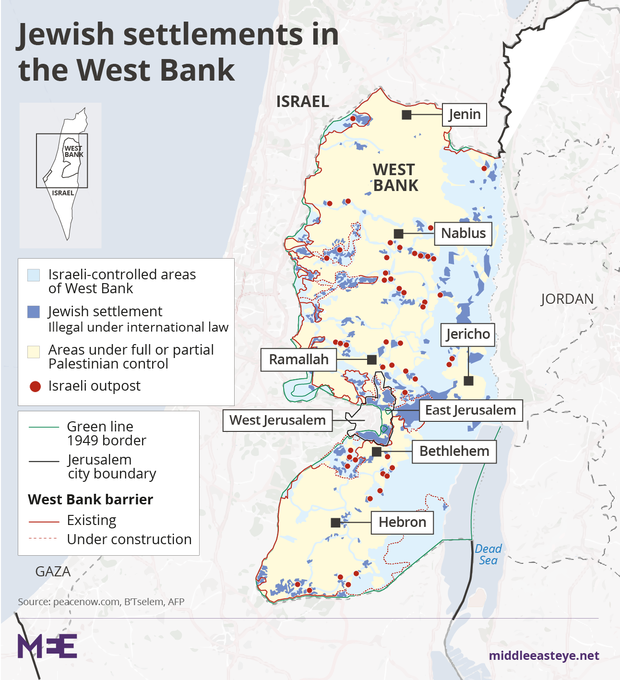
A process towards justice
Another novelty implicit in Trump's Jerusalem declaration is that US leadership of yet another peace process is now out of the question.
If his advisors think they can pressure Palestinians into a deal that looks just a bit better than the Jerusalem declaration, they didn’t understand that Palestinians don't need a deal, they need justice, freedom and equality.
We have been resisting for 100 years now, and there is no reason to think anything would force us to come to a deal during Trump's presidency.
We don't even need a peace process - such negotiations in the past have essentially helped Israel to continue its illegal settlement policy while the world excused its failure to put pressure on Israel as an effort not to disturb negotiations.
Trump has even rendered null the raison d'être of the Palestinian National Authority (PNA), created to administer occupied Palestinians during the peace process towards a Palestinian state. It seemingly doesn't even serve US interests anymore.
The only option reasonably left for the PNA is to abdicate its political role, immediately stop serving Israel's interests in repressing its own people and transition into an agency to administer necessary services to the Palestinian people.
There may be other actors attempting to come in to fill the void as the US has given up on one of the key instruments of its hegemony in the region. However, before asking who can lead the new diplomatic impulse, it is important to know what new paths should be undertaken.
In front of a likely refusal by Israel to accept any other player to lead negotiations, the only option available is that of a concerted effort to enforce Israeli respect for international law and human rights through instruments that hold those breaching the law accountable and make Israeli occupation and apartheid unsustainable.
On the ground this translates into a redoubled commitment to organise growing popular protests and disobedience among Palestinians across all lands under Israeli control.
Fresh thinking
Now it is time that we actively work to overcome the fragmentation Israel has imposed on us through military checkpoints, walls, siege and different legal statuses in front of their authorities. It is time to build a new united leadership, instead of the obsolete PNA, to bring fresh thinking to our struggle.
Internationally, we need to count on all those that want to uphold international law, human rights and justice for Palestine. Growing the movement in support of Boycott, Divestment and Sanctions against Israeli human rights violations is today more urgent than ever.
States as well should now dig in the toolbox that has in the past successfully ended "one state realities with unequal rights," that is apartheid. Ending business as usual is crucial.
An excellent start is to ensure that the United Nations Human Rights Council's database of corporations involved in Israel's illegal settlement project, including in Jerusalem, be duly released before the end of the year and then guarantee that the listed corporations do not receive public contracts, subsidies or other aids.
These are the alternative processes towards justice, freedom and equality for Palestinians that Trump yesterday has rendered almost unavoidable. A fresh thinking that can not only save Jerusalem but bring peace to the region.
- Jamal Juma' was born in Jerusalem and attended Birzeit University, where he became politically active. Since the first Intifada, he has focused on grassroots activism. Juma' is since 2002 the coordinator of the Palestinian Grassroots Anti-Apartheid Wall Campaign and since 2012 the coordinator of the Land Defence Coalition, a network of Palestinian grassroots movements.
Disclaimer: The views expressed here are the author's personal views, and do not necessarily represent the views of Newsclick.
Get the latest reports & analysis with people's perspective on Protests, movements & deep analytical videos, discussions of the current affairs in your Telegram app. Subscribe to NewsClick's Telegram channel & get Real-Time updates on stories, as they get published on our website.









